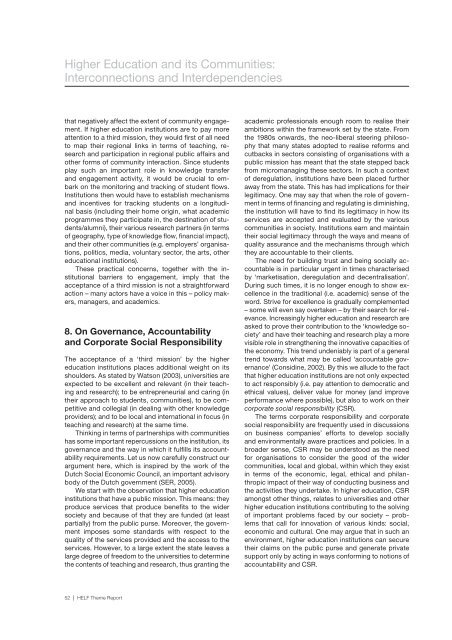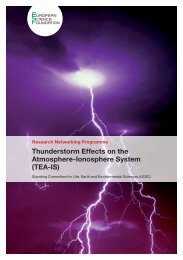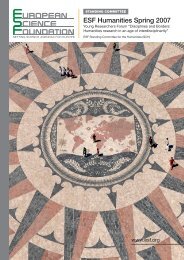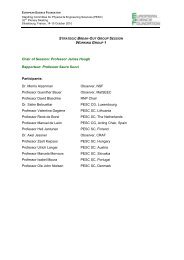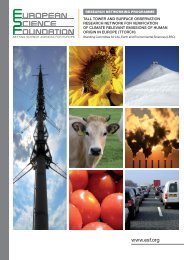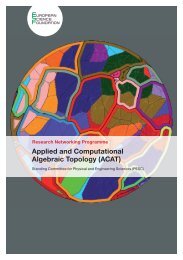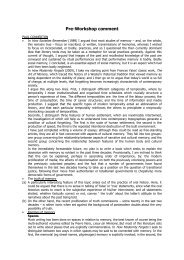Report - European Science Foundation
Report - European Science Foundation
Report - European Science Foundation
You also want an ePaper? Increase the reach of your titles
YUMPU automatically turns print PDFs into web optimized ePapers that Google loves.
Higher Education and its Communities:<br />
Interconnections and Interdependencies<br />
that negatively affect the extent of community engagement.<br />
If higher education institutions are to pay more<br />
attention to a third mission, they would first of all need<br />
to map their regional links in terms of teaching, research<br />
and participation in regional public affairs and<br />
other forms of community interaction. Since students<br />
play such an important role in knowledge transfer<br />
and engagement activity, it would be crucial to embark<br />
on the monitoring and tracking of student flows.<br />
Institutions then would have to establish mechanisms<br />
and incentives for tracking students on a longitudinal<br />
basis (including their home origin, what academic<br />
programmes they participate in, the destination of students/alumni),<br />
their various research partners (in terms<br />
of geography, type of knowledge fl ow, financial impact),<br />
and their other communities (e.g. employers’ organisations,<br />
politics, media, voluntary sector, the arts, other<br />
educational institutions).<br />
These practical concerns, together with the institutional<br />
barriers to engagement, imply that the<br />
acceptance of a third mission is not a straightforward<br />
action – many actors have a voice in this – policy makers,<br />
managers, and academics.<br />
8. On Governance, Accountability<br />
and Corporate Social Responsibility<br />
The acceptance of a ‘third mission’ by the higher<br />
education institutions places additional weight on its<br />
shoulders. As stated by Watson (2003), universities are<br />
expected to be excellent and relevant (in their teaching<br />
and research); to be entrepreneurial and caring (in<br />
their approach to students, communities), to be competitive<br />
and collegial (in dealing with other knowledge<br />
providers); and to be local and international in focus (in<br />
teaching and research) at the same time.<br />
Thinking in terms of partnerships with communities<br />
has some important repercussions on the institution, its<br />
governance and the way in which it fulfills its accountability<br />
requirements. Let us now carefully construct our<br />
argument here, which is inspired by the work of the<br />
Dutch Social Economic Council, an important advisory<br />
body of the Dutch government (SER, 2005).<br />
We start with the observation that higher education<br />
institutions that have a public mission. This means: they<br />
produce services that produce benefits to the wider<br />
society and because of that they are funded (at least<br />
partially) from the public purse. Moreover, the government<br />
imposes some standards with respect to the<br />
quality of the services provided and the access to the<br />
services. However, to a large extent the state leaves a<br />
large degree of freedom to the universities to determine<br />
the contents of teaching and research, thus granting the<br />
academic professionals enough room to realise their<br />
ambitions within the framework set by the state. From<br />
the 1980s onwards, the neo-liberal steering philosophy<br />
that many states adopted to realise reforms and<br />
cutbacks in sectors consisting of organisations with a<br />
public mission has meant that the state stepped back<br />
from micromanaging these sectors. In such a context<br />
of deregulation, institutions have been placed further<br />
away from the state. This has had implications for their<br />
legitimacy. One may say that when the role of government<br />
in terms of financing and regulating is diminishing,<br />
the institution will have to find its legitimacy in how its<br />
services are accepted and evaluated by the various<br />
communities in society. Institutions earn and maintain<br />
their social legitimacy through the ways and means of<br />
quality assurance and the mechanisms through which<br />
they are accountable to their clients.<br />
The need for building trust and being socially accountable<br />
is in particular urgent in times characterised<br />
by ‘marketisation, deregulation and decentralisation’.<br />
During such times, it is no longer enough to show excellence<br />
in the traditional (i.e. academic) sense of the<br />
word. Strive for excellence is gradually complemented<br />
– some will even say overtaken – by their search for relevance.<br />
Increasingly higher education and research are<br />
asked to prove their contribution to the ‘knowledge society’<br />
and have their teaching and research play a more<br />
visible role in strengthening the innovative capacities of<br />
the economy. This trend undeniably is part of a general<br />
trend towards what may be called ‘accountable governance’<br />
(Considine, 2002). By this we allude to the fact<br />
that higher education institutions are not only expected<br />
to act responsibly (i.e. pay attention to democratic and<br />
ethical values), deliver value for money (and improve<br />
performance where possible), but also to work on their<br />
corporate social responsibility (CSR).<br />
The terms corporate responsibility and corporate<br />
social responsibility are frequently used in discussions<br />
on business companies’ efforts to develop socially<br />
and environmentally aware practices and policies. In a<br />
broader sense, CSR may be understood as the need<br />
for organisations to consider the good of the wider<br />
communities, local and global, within which they exist<br />
in terms of the economic, legal, ethical and philanthropic<br />
impact of their way of conducting business and<br />
the activities they undertake. In higher education, CSR<br />
amongst other things, relates to universities and other<br />
higher education institutions contributing to the solving<br />
of important problems faced by our society – problems<br />
that call for innovation of various kinds: social,<br />
economic and cultural. One may argue that in such an<br />
environment, higher education institutions can secure<br />
their claims on the public purse and generate private<br />
support only by acting in ways conforming to notions of<br />
accountability and CSR.<br />
52 | HELF Theme <strong>Report</strong>


